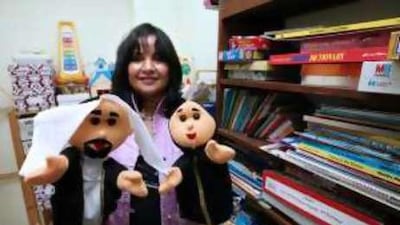Dr Raghesry Singhania is a neuro-developmental paediatrician in Dubai.
I specialise in neuro-developmental medicine, so I'm working mainly with children that have developmental problems. I'm especially interested in autism. I was always interested in children's development, so when I got my MD I decided to specialise, and worked on my PhD at Great Ormond Street hospital in London.
The most important thing for me is that children have a special way of seeing things and are treated accordingly. There are two aspects to this. One is special needs children: many people don't look at them as separate beings requiring special treatment - they are just considered "slow", which does them a disservice. Second: children are extremely direct. You have to get into the child's world, and for them to trust you, you have to be very centred and very authentic. What we call "theraplay" is about helping to enter the child's world, and not trying to get the child to do what you want, but following the child and doing what they want. It's very satisfying.
I think here people are much more aware of these issues for special needs kids than when I first arrived, but the effort is in its infancy: there are very few social supports and most of the schools are private schools that, if they see learning problems, tend not to take the child.
I've been working on a play area for the Zenith Tower building by Sameer Al Mahmoud. I've always been interested in play, and I have play workshops with my patients. The company came to me and asked if I could help them develop a dedicated play area in their building. I think it should be made mandatory for tall buildings here, as children can't go out and play. There are buildings that have climbing frames, but we want: a) a dedicated play area, and b) areas for all the different age groups, such as somewhere for teenagers to hang out and play pool, go rock-climbing and be stimulated cerebrally and socially. We really lack social play here.
Play is how children intuit and learn about life. Adults can understand through language, but they don't have that facility fully until after the age of nine, and it continues to develop. Play in adults is very important too, though it's a different sort of play - a lot of it is about socialising or sport, but it's difficult to define. One definition of adult play, though, is that you do it for the fun of it, the sake of playing, not for winning or medals. But for children, especially young children, it's a learning tool - stimulating them in order to teach them.
School is so regimented - if we adults had to do that we'd rebel. But to be so disciplined is hard for children: play helps emotional problems, but nowadays we have to actually teach them how to play, give them opportunities and stimulation, because if you asked them to play now, most of them would go to play video games and watch TV in isolation. So a teenager's area needs to be comfortable, not too jazzy, not too loud, and interesting enough to vie with the TV and computer games.
One of the important things for older kids is that they have an area where they can learn to negotiate, compromise - skills that are learnt through play - and in the Zenith building we want to give them a nice hangout with things like badminton, maybe a place where they can have drinks, sit and talk, a little library, board games and contests, maybe a drama club. A building needs its own people to look after it of course, but if we make it interesting, people who are interested in their children's development may come and live there and create the community living that we often lack around here.
Kids need to learn to live with their neighbours, but they're so often isolated in a flat with no people their own age. These tall buildings are almost like a vertical village, with neighbours and recreation, but right now they hang out in malls and shops. Kids need to go to a place that they can get to by themselves without having to wait for adults to take them in the car, giving them a chance to make friends. They can't go out here so much, as it's too hot, and gardens are few and far between, so this puts something within their reach.
gchamp@thenational.ae

